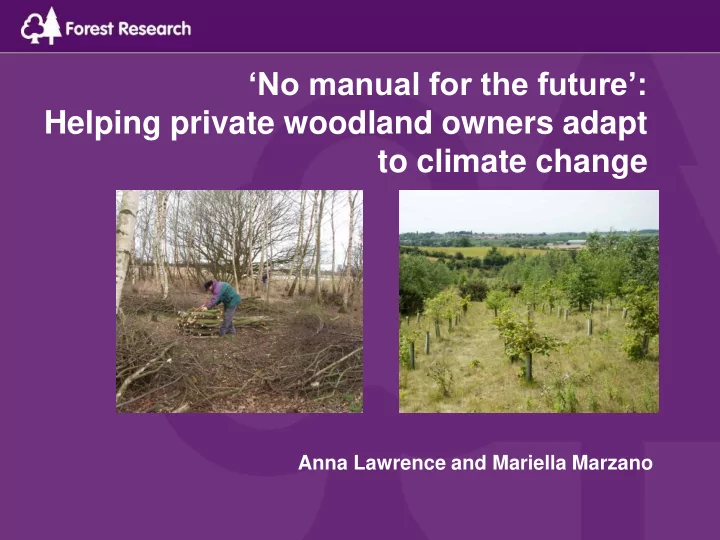

‘No manual for the future’: Helping private woodland owners adapt to climate change Anna Lawrence and Mariella Marzano
Woodland ownership in the UK England N. Scotland Wales Total Ireland Public 214 61 481 114 870 (000 ha) Private 1083 27 909 190 2209 (000 ha) % 84% 31% 65% 63% 72% private 2 14/06/2012
The UK and Wales 3 14/06/2012
Evidence review: owners’ attitudes 34 studies met the criteria • Wildlife and conservation high • priority Culture of ownership / control • / responsibility Economics not explicitly a • priority but related to low confidence in markets not lack of interest Widespread perception of • complexity and bureaucracy Communication is at least as • important as financial incentives But very little evidence from • Wales (Lawrence et al 2010) 4 14/06/2012
Adaptive Forest Management Review of international literature Specific challenges in the UK: Relatively high population • density, intense and multiple demands on land use Fragmented habitats • Fragmented ownership (and • high private ownership) Declining silviculture content in • higher education Potential opportunities in the UK: Strong tradition of partnership • Strong culture of knowledge • networks (Lawrence & Gillett 2011) 5 14/06/2012
MOTIVE • Values and attitudes towards climate change influence responsiveness to adaptive forest management • How forest owners, managers and industry (public and private sector) experience and respond to uncertainty and risk in the context of climate change • Interviews with private sector owners, managers and agents (advisors) in Wales • Questions around perceptions of climate change, current management, experimentation, information sources 6 14/06/2012
Focus on Wales: Policy drivers UK policy drivers • Climate change and delivery of ecosystem services • Woodland creation and management prominent Woodland for Wales (the Welsh forest strategy) Aim: ‘Woodlands are better adapted to ensure a range of benefits’ This means: Clearfelling avoided where alternative management systems would make a better contribution to ecosystem services 7 14/06/2012
Categories of owners • Large woodland owner e.g. Estates • Farmers • Weekend woodland owners • ‘Investment’ or commercial owners • Large NGOs • Local authorities • Public bodies (other than Forestry Commission) • Community woodland groups 8 14/06/2012
Findings: local authority and small scale owners • Not convinced of need to adapt • Those who want to adapt believe it is best to rely on native species “Nobody has proved to me that local biodiversity does not have sufficient “Some of the species they adaptation…to withstand [owners] say they’re choosing is the changes that are because of climate change, but coming” I’m not massively convinced. I think it’s replanting the native (Community Woodlands) woodland and ‘I like these trees” (Public Body - grants) 9 14/06/2012
Findings: estate owners / managers • In general tend to be older and more sceptical of climate change • Some are key advocates of continuous cover forestry “I think there’s probably quite a “It seems beneficial to lot of scepticism on behalf of actually use what’s there landowners that there’s going to within the woodland rather be a problem, which I think is than go to the costs of probably general public clearfelling a site” scepticism anyway” (Estate Manager) (Management Advisor) • More likely to manage for overall resilience not climate change 10 14/06/2012
Findings: commercial plantations • Not widely concerned or interested • Some willing to be innovative “Most commercial investments “…what I’ve been proposing in in forestry tend to have a 10 to 20 year investment some of these woodlands is start period…that’s probably to underplant [with other species] difficult to tie in with climate where we can … the reaction I get change which is over a longer back, ‘oh there’s no market for time period” (Management Silver Fir in this country…well Advisor) maybe there will have to be a market in a few years time” (Management Advisor) 11 14/06/2012
Beliefs about climate change and risk Uncertainty is recognised but: Easier to discuss climate change in the context of pests and • diseases – concerns about species suitability Uncertain commercial potential of future species choice and • markets “Sitka spruce can grow anywhere” “I’m not sure that the connection’s been made (Forest manager) between climate change and growing trees”. (Management Advisor) “[They say] well what would you recommend?’ And it’s hard to say, I mean the usual recommendation is just plant a good variety because there’s no way we can say” (Public body - grants) 12 14/06/2012
Knowledge Exchange “The best feedback we get and “If you’ve got too much the most excited people get is if information, sometimes they have a chance to talk…and you don’t do anything the chance to see somebody about it because it else’s woodland and to hear frightens you” (Public Body – non FC) somebody else being passionate and explaining what they’ve done” (Community Woodlands) “ We don’t know…even with good advice with people who have thought about Photo: Ted Wilson these things, the unknowns like disease…mean that advice very quickly can be discarded” (Public body – non FC) 13 14/06/2012
Conclusions Preliminary research • Understand the stakeholders • Very different types, with different values and motivations • Some of their behaviours are probably helpful vis a vis • climate change • Species choice • Silvicultural systems Work with their priorities • Policy drivers and owner / manager motivations are not • necessarily related to climate change although the outcomes may be Invest in communication: • information / demonstration / networking and field based • knowledge exchange is part of the answer 14 14/06/2012
Recommend
More recommend